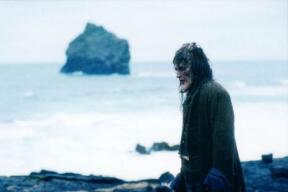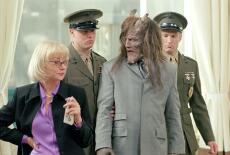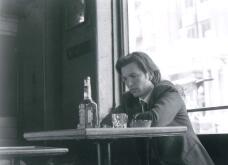Creation = Growth: An Interview with Filmmaker Hal Hartley
by Dave heaton
 Hal Hartley's style of writing dialogue is instantly recognizable, if hard to describe. It captures the way people really talk--over, under and across each other--while also feeling mysterious and philosophical, like anything but an attempt at realism. His use of music, both that of others and his own beautiful compositions, is similarly distinct, as is the way he tells stories, which is decidedly non-Hollywood (meaning no forced conclusions, no overly dramatic "surprises"). His earliest films (The Unbelievable Truth, Simple Men, Trust, Surviving Desire) are highly regarded as a mark of the 90s resurgence of American independent cinema, yet they deserve to be held in high esteem even outside of that context, as insightful and funny looks at people and their lives as well as superb evocations of particular moods and feelings. And as the years pass, Hartley is continually expanding his palette; his more recent films take in a wider array of subjects, ideas, situations, locations, and emotions. His most recent film, 2002's No Such Thing, was ostensibly his attempt at a "monster movie," a story of a creature who doesn't fit in anywhere, yet is also a sharp satire of our information-driven society, a touching story of friendship and love, and much more. It's a film that's both entertaining and thought-provoking, and a sign that Hal Hartley's filmmaking is continually evolving.
Hal Hartley's style of writing dialogue is instantly recognizable, if hard to describe. It captures the way people really talk--over, under and across each other--while also feeling mysterious and philosophical, like anything but an attempt at realism. His use of music, both that of others and his own beautiful compositions, is similarly distinct, as is the way he tells stories, which is decidedly non-Hollywood (meaning no forced conclusions, no overly dramatic "surprises"). His earliest films (The Unbelievable Truth, Simple Men, Trust, Surviving Desire) are highly regarded as a mark of the 90s resurgence of American independent cinema, yet they deserve to be held in high esteem even outside of that context, as insightful and funny looks at people and their lives as well as superb evocations of particular moods and feelings. And as the years pass, Hartley is continually expanding his palette; his more recent films take in a wider array of subjects, ideas, situations, locations, and emotions. His most recent film, 2002's No Such Thing, was ostensibly his attempt at a "monster movie," a story of a creature who doesn't fit in anywhere, yet is also a sharp satire of our information-driven society, a touching story of friendship and love, and much more. It's a film that's both entertaining and thought-provoking, and a sign that Hal Hartley's filmmaking is continually evolving.
What can you tell me about the next film you're making, Nova? (i.e. story, inspiration, or whatever you're willing to share)
The next film is a satire about consumer culture. I'm only in the early stages of designing, but the script is written and I think it'll be a film not unlike The Book Of Life. A fake sci-fi movie about the way we live now.
What was it like shooting No Such Thing in Iceland? Though you've filmed outside of the US before, that film had some landscape shots that seemed atypical for you (and were gorgeous, by the way).
 The landscape was the first idea. That is, except for the idea of a Monster who can't die. It was actually quite difficult to fit the landscape in. It is so overwhelming and beautiful when you're standing there, but its hard to fit it into the camera, so to speak. I watched car commercials. Many of them are shot in Iceland.
They're good at showing one object in a landscape. Knowing I would be shooting the film the following year, I took an opportunity to make a half hour film for German TV which I purposefully set in the woods and fields of upstate New York because you're right, I have not spent much time with landscapes. My movies have tended to be close to the characters. And that's still the case; I get excited about making motion pictures when I decide who I'm going to make those pictures of. With No Such Thing it was a question of how to evoke the landscape though pictures of the characters doing things - walking, fixing their car, waiting for their friends, etc.
The landscape was the first idea. That is, except for the idea of a Monster who can't die. It was actually quite difficult to fit the landscape in. It is so overwhelming and beautiful when you're standing there, but its hard to fit it into the camera, so to speak. I watched car commercials. Many of them are shot in Iceland.
They're good at showing one object in a landscape. Knowing I would be shooting the film the following year, I took an opportunity to make a half hour film for German TV which I purposefully set in the woods and fields of upstate New York because you're right, I have not spent much time with landscapes. My movies have tended to be close to the characters. And that's still the case; I get excited about making motion pictures when I decide who I'm going to make those pictures of. With No Such Thing it was a question of how to evoke the landscape though pictures of the characters doing things - walking, fixing their car, waiting for their friends, etc.
How did Fridrik Thór Fridriksson become involved as producer of the film? Also, forgive my ignorance, but does Iceland have a strong film culture? He's the only Icelandic filmmaker who I'm familiar with.
Iceland is a sparsely populated place, so there aren't many filmmakers as compared to other places. But they are very into film and these days see almost anything you can see in Paris, London, or New York. Fridrik had a lot to do with this in the late seventies and early eighties. He ran the little film festival and when he had to made films to show in it. There are older filmmakers who specialize in traditional Icelandic stories; bearded guys who would look down and growl, shaking their heads, when I told them I was going to make a movie in Iceland. They sincerely believe it is impossible for a foreigner to capture the landscape. Now, I believe them. Also, like most places I travel these days, it seems everyone under the age of 35 wants to make films. So there is a lot of activity there right now.
No Such Thing is on the surface a "monster movie," but also a critique of our "information society" and the modern-day media. Do you think of the film as having more social commentary than your other films? Do you personally have concerns about the technology-obsessions and fast-news culture of today?
 I don't think No Such Thing is any more or less engaged with contemporary concerns than my other films. But, yes, I think its a bit more emphatic. Still, it's not technology per se that the film
satirizes, but the short attention span of cultures willing to believe that anything broadcast is important and accurate.
I don't think No Such Thing is any more or less engaged with contemporary concerns than my other films. But, yes, I think its a bit more emphatic. Still, it's not technology per se that the film
satirizes, but the short attention span of cultures willing to believe that anything broadcast is important and accurate.
Around the time of Henry Fool, I read some interviews with you that gave the impression you were thinking a bit more about how many people would see your movies and how much money your movies make. Are those bigger concerns for you these days then a few films ago? In what ways do audience and commercial factors affect you when you're planning, writing, or making a film?
I've always wanted as many people as possible to see my films. Though, I understand my films are not as popular as many others that have enormous amounts of money for advertising. But my films address everyone, not a small selected group or community of rarified folk. I believe that if the world were a better, more sane and imaginative place, my films would be the most popular ones.
In general in what ways do you think your approach to making films has changed since you first started as a filmmaker?
I think the making of films again and again changes you. You grow and change by way of making films rather than thinking about them. Thinking is important, but it's no substitute for actually making. After a while making becomes a way of thinking. And that leads you to different places.
I read on the Possible Films web site that you're currently teaching film at Harvard, is that right? How does teaching a film class affect how you think about your own filmmaking, or about film in general? Has teaching led you to any particular insights or surprises?
Teaching is a good way to get back to basics. It's funny: I teach intermediate 16 mm film production - a form of art that will be extinct a few years from now. I have found that this increases my desire to teach it. To make shots in Harvard Yard with students who would rather just use a point-and-shoot video camera is a constant challenge that keeps me tied to the reality of filmmaking. And video-making too. I make film and video pretty much equally. But for me they are two different arts. And no one understands what I'm talking about. Except, of course, the other teachers. Who rock.
At this point in your career, when you're writing a film how self-conscious are you about how similar it is to what you've done in the past, or to what people might expect a "Hal Hartley film" to be? Do you ever find yourself making a conscious effort not to repeat yourself? If you're writing dialogue, for example, and realize that it's typical of your style of writing, do you fight against that or embrace it?
I don't think about the audience at all. But if certain creative strategies are used too often without really being investigated as to whether or not they're the right ones - then I feel it in the writing. But, in fact, I don't think about it that much. Each film seems so different to me. One just makes what the story demands.
Between using the music of Yo La Tengo and other great bands in your films, doing a couple music videos, and casting PJ Harvey in a film, you seem more aware of what's going on in the music world (particularly the "indie rock" or "alternative" music world) than your average filmmaker. Plus there's some musicians who have referenced your work, like the band Unbelievable Truth naming themselves after your film, or the band Spring using dialogue clips from Surviving Desire in a song. Are you a big music fan? What musicians or albums are you excited about lately?
I just listen to what I like. And I'm not a big buyer of CDs. I sort of just let my friends turn me on to things. Luckily, some of my friends are musicians (like PJ or David Byrne), so the input is very informed. Just yesterday I was interviewed for some magazine with Stuart Murdoch of Belle & Sebastian (the Scottish band)... I realized that Stuart - before he started the band - used to send me compilation cassette tapes of music he thought I might like. I had totally forgotten about this. Great music - wide variety - very helpful. I think its like that. People want to talk to each other.
On the web I came across the fact that you recently did a score for a film that wasn't your own, Milk and Honey. What was that like? Was it unusual (or freeing) to create music for a film that you weren't as closely tied to?
That was a nice experience. I knew Joe Maggio, the director. He was a friend of a couple of young producers who used to work for me. He had invited me to a screening of a rough cut of the film and cautioned me before I entered that he had used some of my music from Henry Fool in the temporary version. It worked well, though, I thought. Later on we discussed that maybe I should just do new music for his movie which was like that which he used. The music I made was actually pretty different. But Joe liked it. I was afraid when making it that it would be too musical for his taste - he had said he liked the sort of dissonant, non-music, quality of the Henry Fool cues. Anyway, I worked for about a week and played it for him. And that was that.
Is composing music completely linked to film for you? Do you ever write music that isn't meant for a particular film?
Very rarely. The urge to sit down and make music seems to come about in direct relation to making a film. Although for the past few months I have been preparing the release of a new compilation CD of music from my films and some of the music begged to be re-performed. That led to new arrangements, etc. So, I've been making a lot of music recently for that.
How would you describe your approach to writing film music? Are there styles of film score (or particular composers) that you find especially effective or especially annoying?
I think it's pretty old fashioned for me. I think in terns of motifs and liet motifs, etc... How they eventually fall out in the film might be more modernist, though.
What are your feelings about the DVD format and the features that often accompany it? Do you ever have the inclination to do a double-disc "Special Edition" version of one of your films?
No. I just wish the assholes who manufacture this stuff would all get on the same page and manufacture product we can all watch on the same machines, etc...
It seems like you've remained comfortably outside of mainstream, Hollywood filmmaking; is it tougher than it seems? Are you ever tempted to do something just for the cash, to take on a hack jab as the fourth screenwriter for some big Hollywood blockbuster?
I have to admit I am incapable of taking a hack job as a screenplay writer or director. In fact, I would rather drive a cab than be a Hollywood screenplay doctor. It would be more interesting.
One last question. One of my favorite films of yours is one that seems to be often regarded as one of your "lesser" films: Flirt. How surprised have you been by which films are well-received (either critically or by audiences) and which are less so?
 That's good to hear. Flirt is what I consider to be one of my
most accomplished pieces. It has its flaws, I'm sure. But I knew I was growing with it and felt it at the time. I still do, when I look at it now. But I was not surprised it was not thought of as a major film. It was, in fact, made as an alternative to larger films like Amateur, which I had just finished. I felt the need to make more alternative work in an alternative way. (It was made over three years as three separate films...) I believe Colombia-Tristar Home Entertainment
plans to release it on DVD in the coming year.
That's good to hear. Flirt is what I consider to be one of my
most accomplished pieces. It has its flaws, I'm sure. But I knew I was growing with it and felt it at the time. I still do, when I look at it now. But I was not surprised it was not thought of as a major film. It was, in fact, made as an alternative to larger films like Amateur, which I had just finished. I felt the need to make more alternative work in an alternative way. (It was made over three years as three separate films...) I believe Colombia-Tristar Home Entertainment
plans to release it on DVD in the coming year.
I'm not really very surprised anymore about how the films get received.
Copyright (c) 2005 erasing clouds |
Note: Photos from No Such Thing and Flirt, courtesy of Possible Films. |